Turkish Coffee: 7 things you should know for the perfect cup of coffee
Have you been looking for the best Turkish Coffee recipe? I’ve got you covered!
Welcome, fellow travellers and coffee enthusiasts, to the enchanting world of Turkish coffee! As someone who has lived in Turkey for years, I’ve had the privilege of indulging in countless cups of this deliciousness, witnessing its preparation in various ways.

From traditional coffeehouses to cosy homes, the art of making Turkish coffee has been ingrained in the daily fabric of Turkish culture for centuries. As your guide to capturing the true magic of Turkish coffee, I bring not only my personal experiences of drinking it but also the understanding that comes from witnessing its creation time and time again.
Whether you have already wandered through the vibrant streets of Istanbul or are eagerly planning your first visit to this captivating land, I invite you to join me on this journey to unlock the secrets, traditions, and tantalizing flavours that Turkish coffee has to offer.
What is Turkish Coffee?
Turkish coffee is a unique type of coffee that has been around for centuries. It differs from other types of coffee in the way it is brewed, with finely ground coffee beans that are boiled with water and sugar to produce a thick, creamy texture.
Turkish coffee is lower in caffeine than regular espresso or drip-brewed coffees. While the amount of caffeine varies depending on the roast and grind of the beans, generally it has less than half the amount of caffeine as regular coffees.
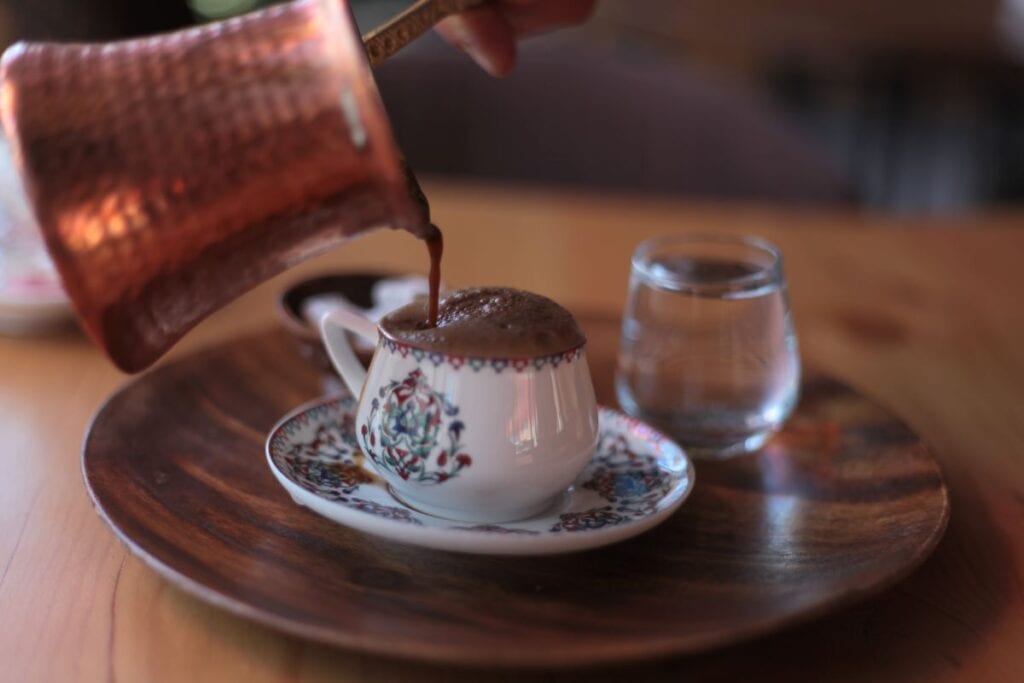
It also has a rich history – it was first brewed in Arabia during the 16th century and then spread throughout Turkey during the Ottoman Empire. This traditional brewing practice is still used today in Turkey and other parts of the Middle East, and has become popular in many other parts of the world due to its unique flavor profile.
Overall, Turkish coffee offers a unique experience: a delicious-tasting brew with lower amounts of caffeine compared to other varieties.
Where to buy Turkish Coffee
Turkish coffee, one of many beloved drinks in Turkey, can be purchased from various places, both online and offline. Here are some common options for buying Turkish coffee:
- Local Specialty Stores: Check if there are any local speciality stores or gourmet shops in your area that carry Turkish coffee. These stores often have a selection of international coffees, including Turkish coffee.
- Turkish or Middle Eastern Grocery Stores: Turkish coffee is a staple in Turkish and Middle Eastern cuisine, so you can find it in grocery stores that cater to these communities. Look for stores that specialize in Turkish or Middle Eastern products in your area.
- Online Retailers: Numerous online retailers offer Turkish coffee for purchase. You can browse popular e-commerce platforms like Amazon, eBay, or speciality coffee websites. Search for “Turkish coffee” to find options, read reviews, and compare prices.
- Turkish Coffee Brands: Several coffee brands specialize in Turkish coffee and offer their products online. Look for reputable Turkish coffee brands and visit their official websites to place an order directly.
- Local Coffee Roasters: Some local coffee roasters may offer Turkish coffee as part of their product lineup. Check if any nearby coffee roasters or artisanal coffee shops offer Turkish coffee and visit their physical store or website to make a purchase.
- While visiting Turkey: You can grab some freshly packaged from Mehmet Efendi like all the locals. This is the brand that I drink and love!

**Remember that Turkish coffee is typically ground very fine, almost like powder, so you may want to ensure that the coffee you purchase is suitable for Turkish coffee brewing methods.
Turkish Coffee Culture
Turkish coffee culture is deeply ingrained in the rich traditions and social fabric of Turkey. It represents more than just a beverage; it is a symbol of hospitality, friendship, and connection.
There is an old Turkish proverb that makes this point perfectly. The Turkish proverb “bir fincan kahvenin kırk yıl hatırı vardır” translates to “the memory of a cup of coffee lasts for forty years.” What does it mean?
In Turkish culture, offering a cup of coffee to a guest holds deep meaning. It signifies a warm welcome, friendship, and an invitation to engage in meaningful conversation. The proverb suggests that the memories and bonds formed during that shared moment of enjoying coffee together can endure for a lifetime.
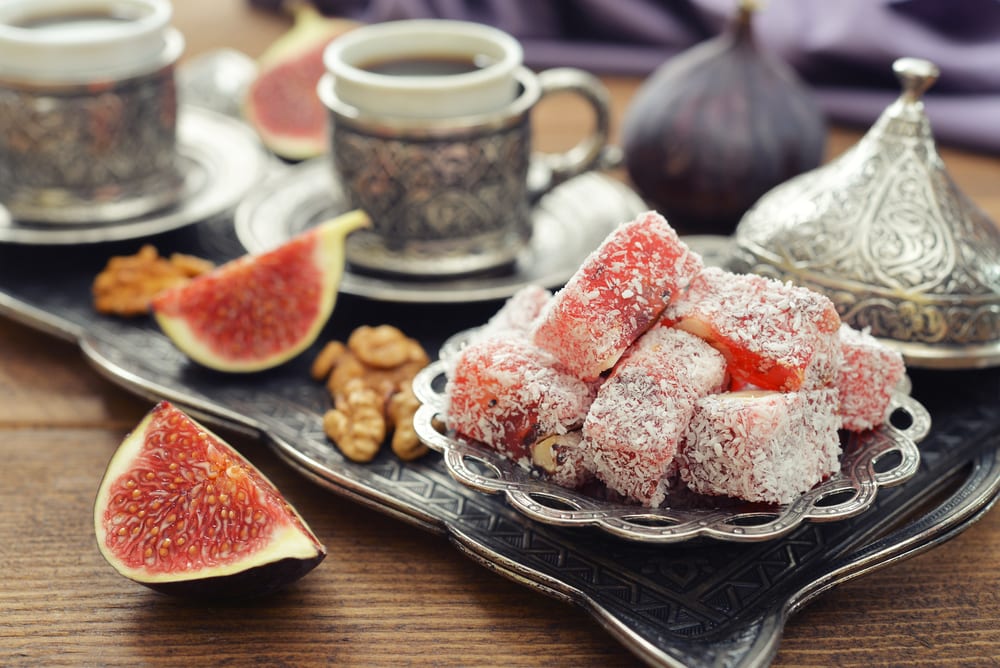
It emphasizes the value of hospitality, the importance of cherishing relationships, and the lasting impressions that small gestures of kindness can leave. It serves as a reminder to appreciate the profound connections and enduring memories that can be created through the simple act of sharing a cup of coffee.
Turkish coffee culture fosters a sense of togetherness and a slower pace of life, emphasizing the value of human connection and taking the time to appreciate the moment. It has become a cherished part of Turkish identity and a cultural symbol that showcases the country’s warmth, hospitality, and love for flavorful coffee.
Turkish Coffee Ingredients
Turkish Coffee is an important part of the culture in Turkey and it’s a must-try for anyone who visits.
To make it, you will need traditional Turkish coffee (Arabica beans from Turkey ground to a powder), cold water, sugar (optional), and a cezve (a special pot).
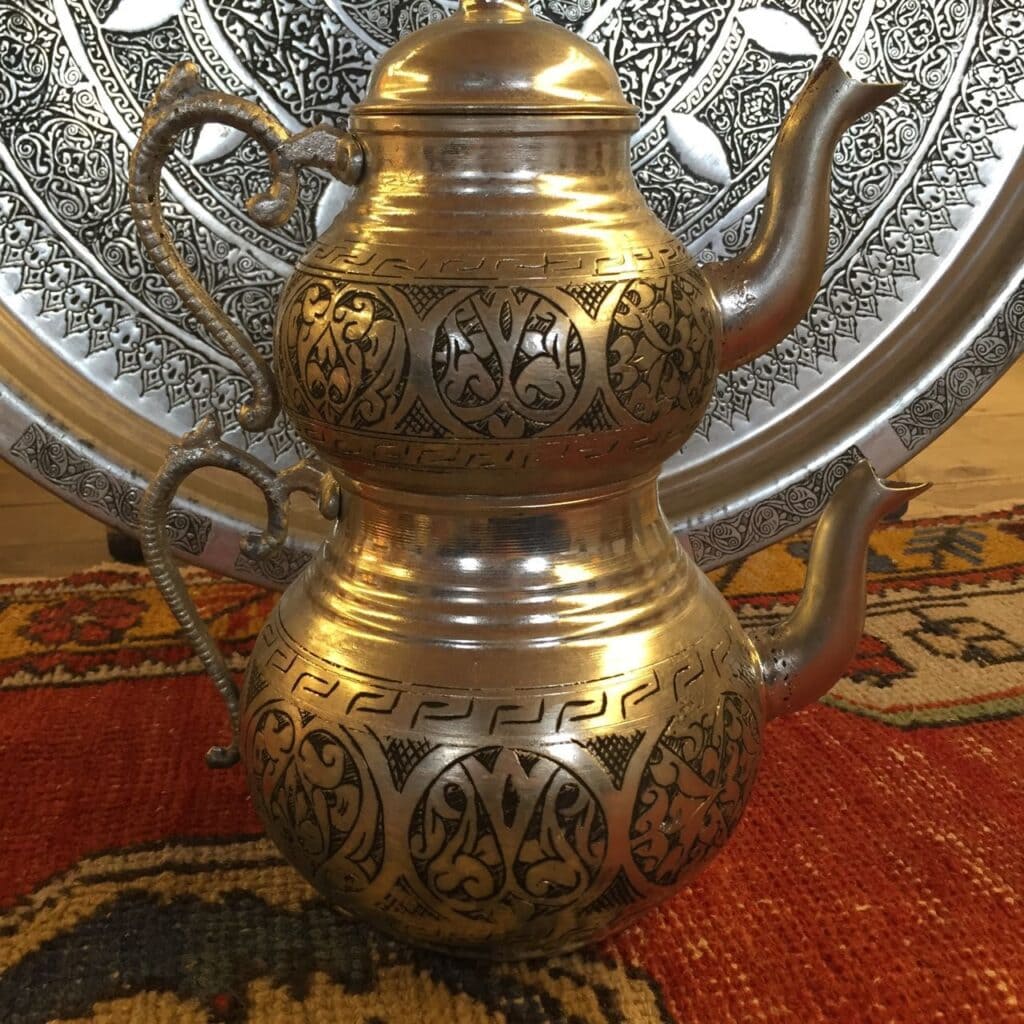
You’ll also need a small cup of cold water and a small piece of chocolate or Turkish delight to serve it like a local. Making Turkish Coffee takes around 5 minutes, but it’s worth the effort: the taste is unique and very strong!
Making Turkish Style Coffee
Turkish coffee preparation is an art form, with a meticulous process that has been passed down through generations. The finely ground coffee beans are carefully brewed in a small cezve, a special pot, over low heat, allowing the flavours to develop slowly.
The resulting coffee is served in small cups, accompanied by a glass of water to cleanse the palate. The process of enjoying Turkish coffee involves savouring each sip, as well as engaging in meaningful conversation and social interaction.
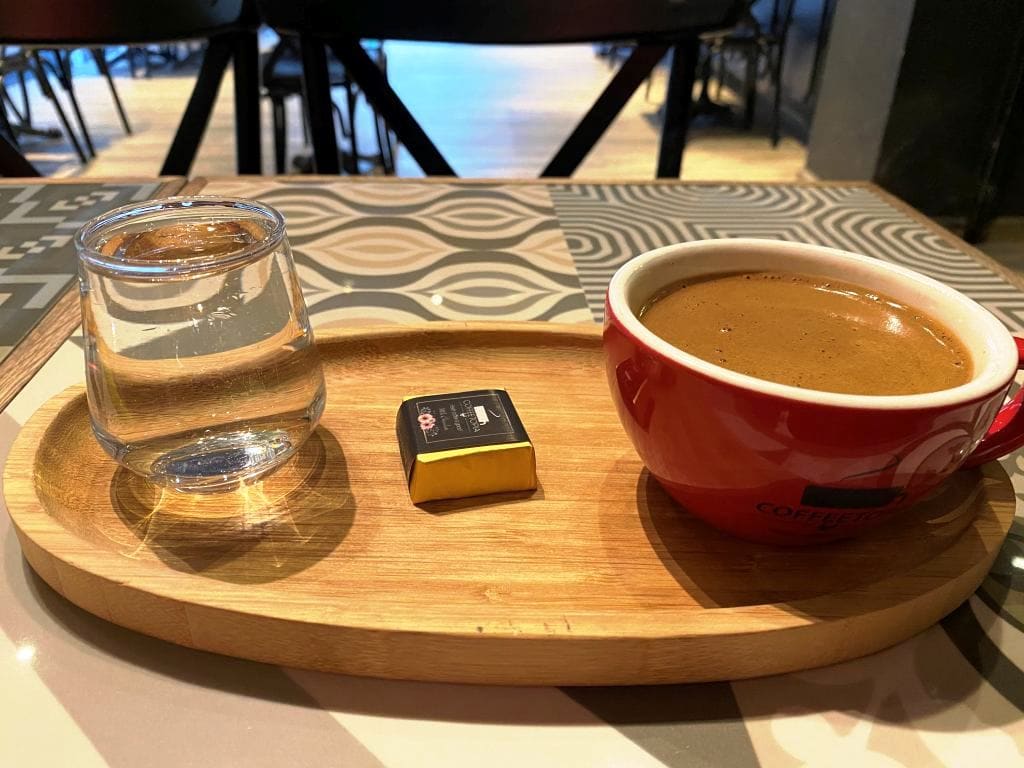
Here’s a simplified step-by-step guide on how to make Turkish coffee
1. Measure the water and coffee:
Start by measuring the amount of water you’ll need per serving. Use Turkish coffee cups (demitasse cups) to measure the water. For each cup, you’ll typically need about 1 demitasse cup (approximately 70-90 ml) of water. Then, measure the finely ground Turkish coffee. Use about 1 heaping teaspoon – 1 tablespoon of coffee per cup depending on preference.
2. Add water and sugar:
Pour the measured water into a small cezve (Turkish coffee pot). If desired, you can add sugar according to your preference. See the variations below for more information.
3. Stir and heat:
Stir the mixture gently to dissolve the sugar. Place the cezve on the stovetop over low heat. It’s important to use low heat to ensure a slow and controlled brewing process.
4. Bring to a simmer:
Allow the mixture to heat gradually over medium-low heat until it reaches a gentle simmer. This will take roughly 3-4 minutes. Be sure to keep an eye on it, stirring occasionally to prevent any burning or overflowing.
5. Remove from heat and settle:
Once the coffee starts to bubble and froth, remove it from the heat source. Let it settle for a few seconds to allow the coffee grounds to sink to the bottom of the cezve.
Return it to the stove and repeat the previous step one more time. Once it has come to a simmer a second time, remove it again and let it settle for a few seconds.
This can be repeated up to 4 times depending on the strength of the coffee desired.
6. Serve and enjoy:
Carefully pour the Turkish coffee into small demitasse cups, ensuring that the settled coffee grounds stay in the cezve (Turkish coffee pot). Serve the coffee alongside a glass of water, which is typically provided to cleanse the palate. Allow the coffee to cool for a moment before sipping, as it will be hot. Enjoy the rich flavour and aroma of Turkish coffee slowly, appreciating the moment and the tradition.
Remember, making Turkish coffee requires practice and patience to achieve the desired taste and texture. It may take a few attempts to master the process and adjust the measurements according to personal preference.
Turkish Coffee Variations
Turkish coffee, with its rich and centuries-old tradition, also allows for various delightful variations. Here are some popular variations that you can explore:
- Sade (Plain): Sade refers to plain Turkish coffee, brewed without any additional ingredients. It showcases the pure essence of the coffee beans, allowing you to savour the rich and robust flavours in their simplest form.
- Az Şekerli (Less Sugar): While traditional Turkish coffee often includes sugar during the brewing process, you can adjust the amount of sugar to your liking. Az Şekerli refers to Turkish coffee brewed with less sugar, ideal for those who prefer a milder sweetness or who are watching their sugar intake. Roughly a ½ teaspoon of sugar.
- Orta Şekerli (Medium Sugar): Orta Şekerli indicates Turkish coffee brewed with a moderate amount of sugar. It strikes a balance between sweetness and the intense flavours of the coffee, offering a pleasant and well-rounded taste. Roughly 1 teaspoon of sugar.
- Şekerli (Sweet): For those with a sweet tooth, Şekerli Turkish coffee is brewed with a higher amount of sugar, resulting in a pronounced sweetness that complements the bold coffee flavours. It is a popular choice for those who enjoy a sweeter and more indulgent coffee experience. Roughly 2 teaspoons of sugar.
- With Spices: While not strictly traditional, you can experiment by adding spices to your Turkish coffee. Common additions include cardamom, cinnamon, or even a touch of nutmeg. These spices infuse the coffee with their aromatic notes, creating a unique and flavorful experience.
- With Milk: Also not traditional at all, you can play with substituting milk for water. You will need to pay closer attention that you don’t scald the milk, however.
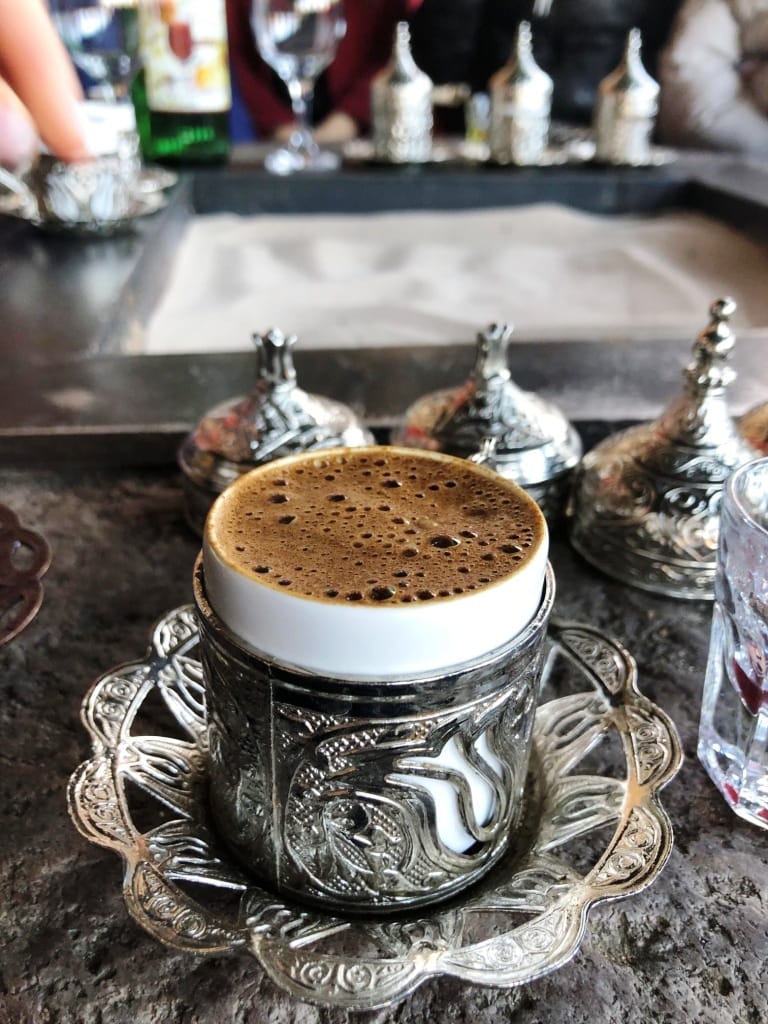
Turkish coffee is a versatile beverage, and these variations offer a chance to tailor it to your personal taste preferences. Feel free to explore and experiment with different flavours to create your own signature Turkish coffee experience.
Tips when brewing Turkish coffee
When making Turkish coffee, there are several key tips to keep in mind for a delicious and authentic experience.
- Pay attention to the coffee grind size. Turkish coffee requires an extremely fine grind, almost like powder, to ensure proper extraction and a rich flavour. See above for where to buy Turkish coffee.
- The foam, known as “köpük,” is an essential element of Turkish coffee. Achieving a thick and velvety foam adds to the texture and enhances the overall taste. It also denotes quality to a local. The thicker the foam, the better the coffee.
- Watch the heat. Be sure to watch the heat while cooking, as Turkish coffee requires a low and gradual simmer to prevent burning and maintain the flavours.
- Alternatives for serving are easy. If you don’t have a traditional cezve, a small saucepan can be a suitable alternative. Or, if you don’t have Turkish coffee cups, opt for small tea cups or espresso glasses. The smaller size helps retain the heat and allows you to savour the coffee in small sips.
These tips can help you create a delightful Turkish coffee experience, immersing yourself in the rich cultural tradition of this beloved beverage.
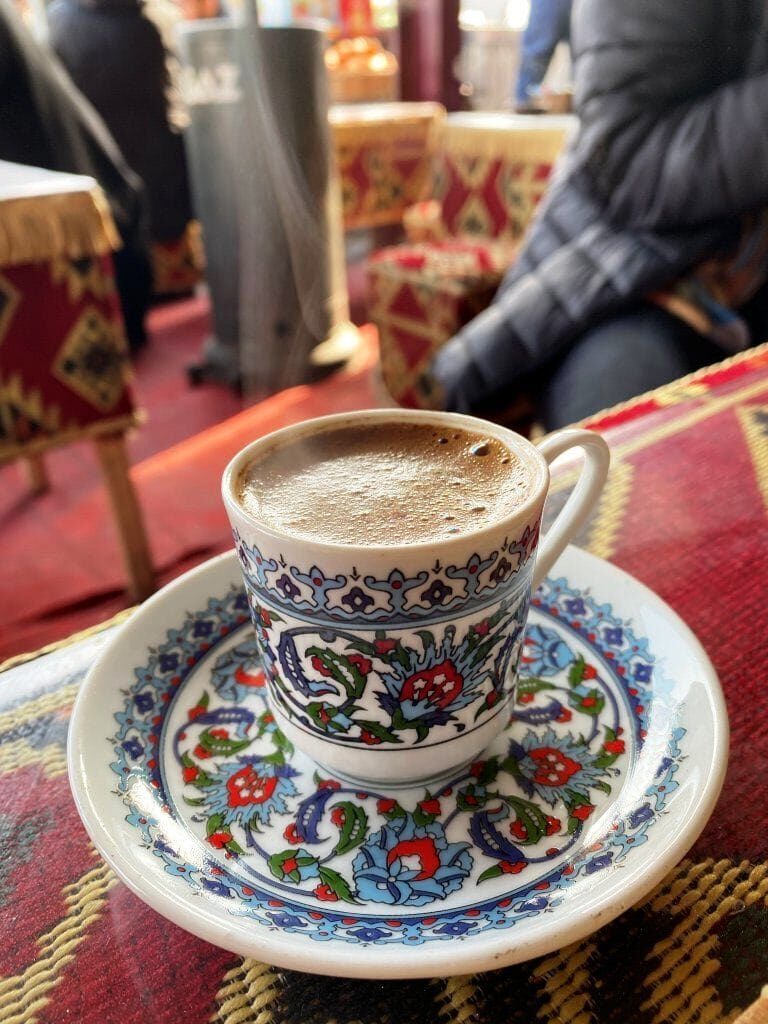
Turkish Coffee FAQs
Is Turkish coffee stronger than espresso?
It depends, Turkish coffee is generally considered stronger than espresso in terms of caffeine content but it depends on how much coffee is used. While both beverages are known for their strong flavour profiles, they come out similar in terms of caffeine content ounce for ounce. A 2-ounce cup of espresso is loaded with 60-65mg of caffeine while Turkish coffee contains approximately 40-60 milligrams of caffeine.
How much caffeine is in Turkish coffee?
The exact caffeine content can vary depending on factors such as the brewing method, the type of beans used, and the serving size. However, on average, a 2-ounce cup of Turkish coffee contains approximately 40-60 milligrams of caffeine.
What is the difference between Turkish coffee and other types of coffee?
The difference between Turkish coffee and other types of coffee is in its preparation method, grind size, and brewing technique. Turkish coffee is served unfiltered, allowing the coffee grounds to settle at the bottom of the cup with a unique flavour profile, and a thick texture, and is often enjoyed with a touch of sugar.
How do I achieve the desired foam (köpük) in Turkish coffee?
To achieve a thick and velvety foam, it is crucial to use freshly roasted and finely ground coffee. Simmer the coffee slowly over low heat, allowing the foam to develop gradually. Avoid stirring the coffee once it starts to foam, as this can disrupt the formation of the desired texture. The foam adds richness to the coffee and enhances the overall experience.
Can I use any type of coffee beans for Turkish coffee?
While Turkish coffee is traditionally made with Arabica coffee beans, you can experiment with different types of coffee beans to suit your taste preferences. However, it’s important to choose beans that can be ground finely enough to achieve the desired consistency. Some speciality coffee shops offer specific blends or single-origin beans labelled for Turkish coffee. Make sure you grab a medium to dark roast for a robust flavor that pairs well with the brewing method.
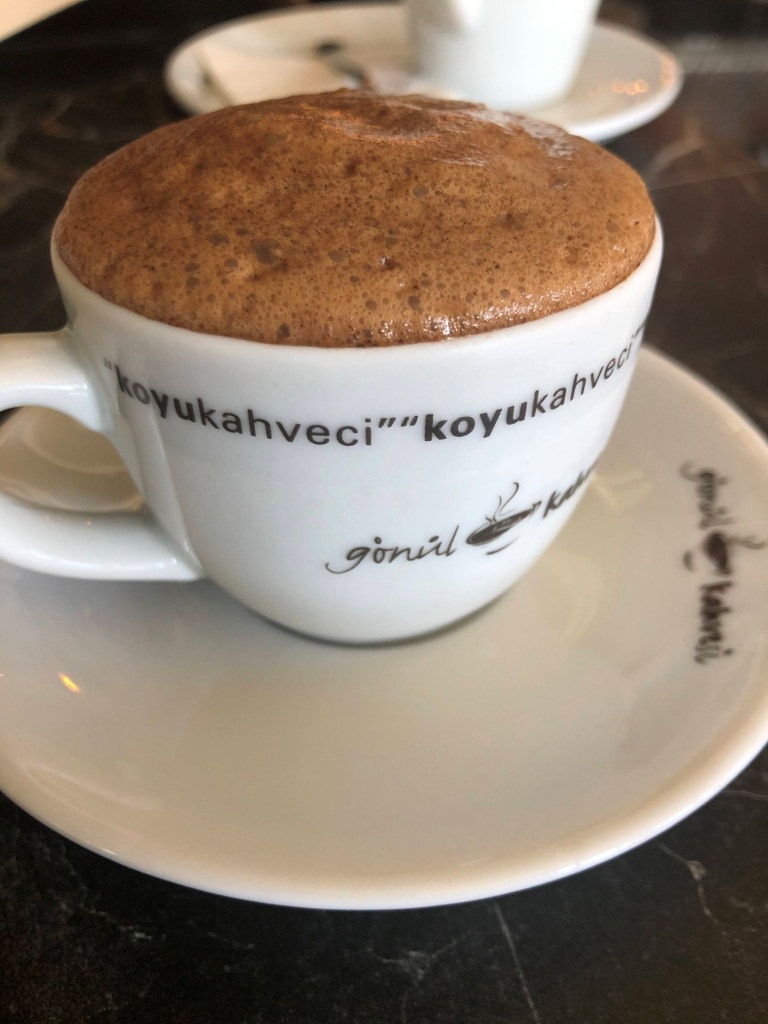
Final Thoughts on Turkish Coffee
Turkish coffee is not just a beverage; it’s an invitation to immerse yourself in the rich cultural tapestry of Turkey. For those who have already visited this captivating country, you may have had the opportunity to savor the velvety foam, indulge in the robust flavours, and experience the warm hospitality that accompanies a cup of Turkish coffee.
For those dreaming of future travels to Turkey, let the allure of Turkish coffee draw you closer to the authentic soul of this extraordinary land. From the bustling bazaars to the serene tea gardens, every sip of Turkish coffee carries within it stories of centuries-old traditions, heartfelt conversations, and shared moments of joy.

So, when you find yourself in Turkey or in the company of Turks, embrace the opportunity to indulge in this cultural delight. So, go ahead, raise your cup, and allow the magic of Turkish coffee to awaken your senses and deepen your appreciation for this beautiful country. Şerefe! (Cheers!)
You may also like to read the following articles on Turkey
Visiting Ephesus the most awe-inspiring site in Turkey
42 scrumptious traditional Turkish foods to try
Visiting the House of Mary in Ephesus Turkey
Things to do in Cappadocia in Winter
Author: Kimberly McCauley is the founder of The Art of Living in Turkey. She moved to Turkey in 2019 and has been exploring this beautiful country ever since. She loves to help people like yourself discover new places to see, learn all the things about Turkey and find the courage to go on an adventure.
Pin it to save it

